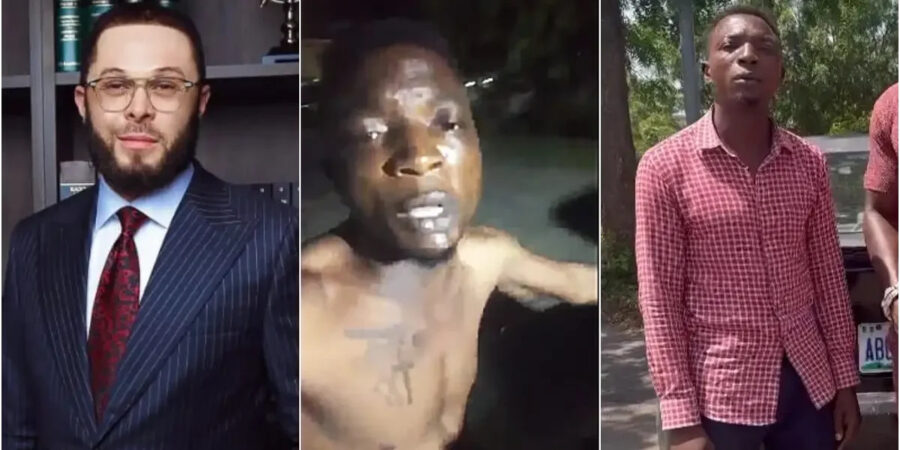Africa
Of The Bolt’s Driver Apology To Hon. Ikwechegh: A Call For Peace And Understanding, by Isaac Asabor

The recent public apology tendered by Stephen Abuwatseya, an Abuja-based Bolt driver, to Hon. Alex Ikwechegh, the House of Representatives member who allegedly assaulted him, has sparked outrage across social media. Many Nigerians, particularly those who rallied behind the driver, felt betrayed and disappointed. They were quick to express their dismay, with some accusing Abuwatseya of being an ingrate who compromised justice for financial gain. But beyond the fury and resentment that followed this unexpected turn of events, it is essential to pause and reflect on the significance of Abuwatseya’s decision to apologize.
The saga began when Abuwatseya alleged that he was slapped by Hon. Ikwechegh, causing public outrage after social activist Martin Vincent Otse, popularly known as VeryDarkMan (VDM), brought the issue to light. VDM, along with human rights lawyer DejiAdeyanju, took up the fight for justice. The outcry led to an investigation by the House of Representatives, which summoned Ikwechegh to account for his actions. The lawmaker later tendered a public apology, expressing regret and acknowledging his misconduct.
However, the narrative took an unexpected twist when VDM shared a video revealing that Abuwatseya had apologized to Ikwechegh. According to VDM, an agreement had been reached wherein Ikwechegh’s camp compensated Abuwatseya with ₦5 million and a new car, terms that Abuwatseya allegedly accepted without informing his advocates. This abrupt apology triggered backlash, with social media users labeling the driver as ungrateful and opportunistic.
While it is easy to join the chorus of condemnation against Abuwatseya, it is crucial to consider the context and motivations behind his actions. In an environment where survival is often a day-to-day struggle, many individuals are driven by the need to secure their immediate wellbeing. The reality of poverty in Nigeria cannot be underestimated; it influences decisions that may appear perplexing or even disappointing to those on the outside looking in.
Abuwatseya’s decision to apologize may not necessarily be a sign of betrayal but rather an effort to find closure and move forward. He might have realized that in the grand scheme of things, holding onto bitterness would only perpetuate the cycle of resentment. His willingness to reconcile with Ikwechegh, despite the past incident, demonstrates a rare but necessary quality, letting go for the sake of peace.
We live in an era where social media amplifies conflicts, often making it harder to forgive and forget. In the heat of public outrage, the human element of forgiveness is frequently overlooked. Abuwatseya’s apology, though surprising, might be his way of seeking peace, not only with his assailant but also within himself.

While VDM, Adeyanju, and countless Nigerians poured their energy into seeking justice for Abuwatseya, the driver ultimately chose a different path. It is easy to judge from afar, but the reality is that forgiveness and reconciliation are deeply personal choices. In a world that is becoming increasingly polarized, Abuwatseya’s gesture reminds us that sometimes, stepping back and making peace, even with those who have wronged us, can be a more rewarding outcome.
The harsh reactions from social media users reflect a larger issue, our tendency to judge quickly and harshly without understanding the full picture. Yes, Abuwatseya’s actions may seem disappointing, especially to those who advocated for him. However, rather than demonizing him, it is more constructive to recognize the complexities of his situation.
In our pursuit of justice, we must not lose sight of empathy. Social activism is vital for holding public figures accountable, but it is also essential to respect the choices of those we claim to be helping. After all, no one but Abuwatseya knows the pressures he faced or the factors that led him to accept the compensation and issue an apology.
At the heart of this incident lies a powerful message: the need for forgiveness, understanding, and reconciliation in our society. While Hon. Ikwechegh’s initial actions were wrong and should not be condoned, his apology showed a willingness to admit fault. Likewise, Abuwatseya’s decision to reconcile is a step toward healing a fractured relationship.
Rather than fixating on the perceived betrayal, Nigerians can learn from this episode. The world is already filled with conflict and division; perhaps what we need more of is the courage to forgive, to accept apologies, and to seek common ground.
Let us not forget that the ability to forgive and move on is a virtue that strengthens the social fabric. Abuwatseya’s apology may have shocked many, but it also highlights an essential truth, we all make mistakes, and sometimes, the best course of action is to let go, extend a hand of peace, and move forward.
As Nigerians, we can choose to dwell on our differences, or we can rise above them to build a more harmonious society. The road to unity is paved with understanding and forgiveness, values that both parties in this unfortunate incident have shown, even if in ways we might not fully agree with.
In the end, making peace, however it comes about, should be seen as a victory for all.
























